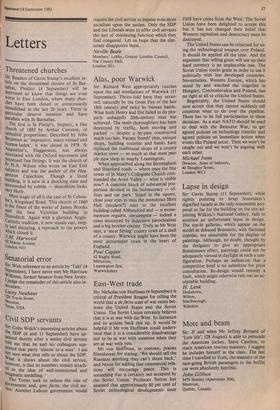East-West trade
Sir: Nicholas von Hoffman (4 September) is critical of President Reagan for telling the world that a de facto state of war exists bet- ween the United States and the Soviet Union. The Soviet Union certainly believes that it is at war with the West. Its literature and its actions back this up. It would be helpful if Mr von Hoffman could unders- tand that it is a considerable disadvantage not to be at war with someone when they are at war with you.
Mr von Hoffman, in contrast, praises Eisenhower for stating: 'We should sell the Russians anything they can't shoot back,' and Nixon for adding that commercial rela- tions will encourage peace. This is something that is certainly not accepted by the Soviet Union. Professor Sutton has assessed that approximately 80 per cent of Soviet technological developments since 1918 have come from the West. The Soviet Union have been delighted to accept this but it has not changed their belief that Western capitalism and democracy must be destroyed.
The United States can be criticised for us- ing the technological weapon over Poland. It should be applied all the time. And the argument that selling grain will use up their hard currency is an implausible one. The Soviet Union stocks grain in order to use it politically with less developed countries. Nevertheless, Western Europe, which has stood by and watched the tragedies in Hungary, Czechoslovakia and Poland, has no right at all to criticise the United States.
Regrettably, the United States should now accept that they cannot suddenly tell countries what to do over the pipeline. There has to be full participation in these decisions. As a start NATO should be used to deal with the Resource War, to get agreed policies on technology transfer and agreed policies on immediate action when events like Poland occur. Then we won't be caught out and we won't be arguing with each other.
Michael Ivens Director, Aims of Industry, 40 Doughty Street, London WCI


































 Previous page
Previous page